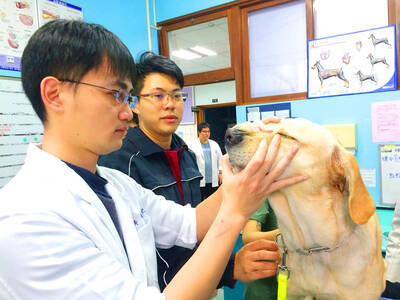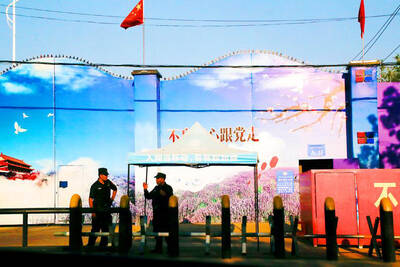The “US Strategic Framework for the Indo-Pacific” last week sparked debate among analysts after US President Donald Trump declassified the document 20 years ahead of schedule.
Trump on Tuesday last week released the document that had governed US strategic action in the region since the US leader approved its use in 2018.
The document, which outlines US priorities in the region, emphasizes the importance of defending Taiwan against military aggression and facilitating the country’s development of asymmetric strategies and capabilities.
The overall directive of the document is for the US to prevent China from establishing sustained air and sea dominance inside the first island chain in a conflict, and dominating all domains outside the chain, the report said.
National Chung Cheng University Graduate Institute of Strategy and International Affairs director Soong Hseik-wen (宋學文) on Friday said that the Trump administration might have declassified the report to establish a precedent regarding Taiwan’s strategic value for US president-elect Joseph Biden’s administration.
Taiwan is the point at which China would most likely attempt to breach the first island chain, he said.
Regarding Taiwan’s response should the incoming administration curb arms sales, Institute for National Defense and Security Research research fellow Ou Si-fu (歐錫富), said that having specific weapons systems is not essential to implementing asymmetric warfare strategies.
“The so-called ‘asymmetry’ refers to avoiding what is strong and striking at what is weak,” he said.
“Even if Biden temporarily suspends arms sales to Taiwan, the military’s priority would be to create a fighting force with the defense items obtained during the Trump administration that would achieve the 2025 goal of layered defense and effective deterrence,” he said.
A government official, speaking on the condition of anonymity, said that the government cannot speculate on Trump’s intention in releasing the document.
However, its reference to asymmetrical warfare is in line with the military’s focus in the past few years of crafting an innovative and asymmetric fighting force, they said.
Examples of this focus include the development of the small, but heavy-hitting, Tuojiang-class corvettes, cost-effective and fast minelayers, and domestically produced submarines, which are in the prototyping phase, they said.
Notably, the US government and defense corporations have been contributing to Taiwan’s submarine program in significant ways, especially in supply and systems integration, they said.
Regarding precision-guided munitions, the military has unveiled the Hsiung Feng III supersonic anti-ship missile and the Hsiung Feng IIE surface-to-surface cruise missile that comprise an important link in Taiwan’s asymmetric warfare capabilities, they said.
The US has shown support for the military’s goals with arms sales and other defense transfers, including approval of the sale of the M142 High Mobility Artillery Rocket System and Mark 48 torpedoes, they said.

Former Czech Republic-based Taiwanese researcher Cheng Yu-chin (鄭宇欽) has been sentenced to seven years in prison on espionage-related charges, China’s Ministry of State Security announced yesterday. China said Cheng was a spy for Taiwan who “masqueraded as a professor” and that he was previously an assistant to former Cabinet secretary-general Cho Jung-tai (卓榮泰). President-elect William Lai (賴清德) on Wednesday last week announced Cho would be his premier when Lai is inaugurated next month. Today is China’s “National Security Education Day.” The Chinese ministry yesterday released a video online showing arrests over the past 10 years of people alleged to be

THE HAWAII FACTOR: While a 1965 opinion said an attack on Hawaii would not trigger Article 5, the text of the treaty suggests the state is covered, the report says NATO could be drawn into a conflict in the Taiwan Strait if Chinese forces attacked the US mainland or Hawaii, a NATO Defense College report published on Monday says. The report, written by James Lee, an assistant research fellow at Academia Sinica’s Institute of European and American Studies, states that under certain conditions a Taiwan contingency could trigger Article 5 of NATO, under which an attack against any member of the alliance is considered an attack against all members, necessitating a response. Article 6 of the North Atlantic Treaty specifies that an armed attack in the territory of any member in Europe,

LIKE FAMILY: People now treat dogs and cats as family members. They receive the same medical treatments and tests as humans do, a veterinary association official said The number of pet dogs and cats in Taiwan has officially outnumbered the number of human newborns last year, data from the Ministry of Agriculture’s pet registration information system showed. As of last year, Taiwan had 94,544 registered pet dogs and 137,652 pet cats, the data showed. By contrast, 135,571 babies were born last year. Demand for medical care for pet animals has also risen. As of Feb. 29, there were 5,773 veterinarians in Taiwan, 3,993 of whom were for pet animals, statistics from the Animal and Plant Health Inspection Agency showed. In 2022, the nation had 3,077 pediatricians. As of last

XINJIANG: Officials are conducting a report into amending an existing law or to enact a special law to prohibit goods using forced labor Taiwan is mulling an amendment prohibiting the importation of goods using forced labor, similar to the Uyghur Forced Labor Prevention Act (UFLPA) passed by the US Congress in 2021 that imposed limits on goods produced using forced labor in China’s Xinjiang region. A government official who wished to remain anonymous said yesterday that as the US customs law explicitly prohibits the importation of goods made using forced labor, in 2021 it passed the specialized UFLPA to limit the importation of cotton and other goods from China’s Xinjiang Uyghur region. Taiwan does not have the legal basis to prohibit the importation of goods